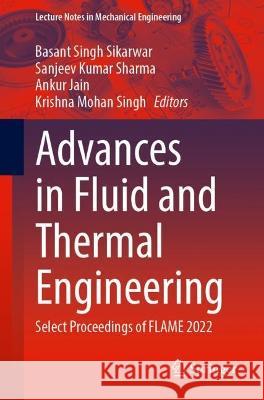Advances in Fluid and Thermal Engineering: Select Proceedings of Flame 2022 » książka



Advances in Fluid and Thermal Engineering: Select Proceedings of Flame 2022
ISBN-13: 9789819923816 / Angielski
Advances in Fluid and Thermal Engineering: Select Proceedings of Flame 2022
ISBN-13: 9789819923816 / Angielski
(netto: 690,08 VAT: 5%)
Najniższa cena z 30 dni: 655,41
ok. 22 dni roboczych.
Darmowa dostawa!
Plasma Functionalized Wettability Gradient Surfaces for Electronic Cooling.- Effect of Porous Plug Shape and Permeability on Convective Heat Transfer Characteristics of Flow through a Mini Channel.- Condition Monitoring of Reciprocating Compressor using ANN.- Novel Supercritical Carbon Dioxide Cycle for a Waste Recovery Application.- Cross-Recurrence Analysis of Pressure Signals in Intermittent Flow Sub-Regimes.- Effect of Linear Varying Diameter on Thermo-hydrodynamics of Two-Phase Closed Thermosyphon.- Investigation of Performance and Smoke Characteristics of Diesel Engine Powered by Various Blends of Biodiesels Extracted from Disposed Edible Oil.- Effect of Inverting Heat Source Direction on the Melting of Phase Change Material under the Influence of Microgravity Environment.- Study of Operating Parameters for a Controllable Water Flash Evaporation.- Numerical Study of Heat Transfer Fluid Position on Solidification of PCM in Fin Assisted Thermal Energy Storage System.
This volume comprises the select proceedings of the 3rd Biennial International Conference on Future Learning Aspects of Mechanical Engineering (FLAME-2022). It aims to provide a comprehensive and broad-spectrum picture of state-of-the-art research and development in thermal and fluid engineering. Various topics covered include flow analysis, thermal systems, flow instability, renewable energy, hydel and wind power systems, heat transfer augmentation, biomimetic/ bioinspired engineering, heat pipes, heat pumps, multiphase flow/ heat transfer, energy conversion, thermal hydraulics of nuclear systems, refrigeration, and HVAC systems, computational fluid dynamics, fluid-structure interaction, etc. This volume will prove a valuable resource for those in academia and industry.
1997-2026 DolnySlask.com Agencja Internetowa
KrainaKsiazek.PL - Księgarnia Internetowa









